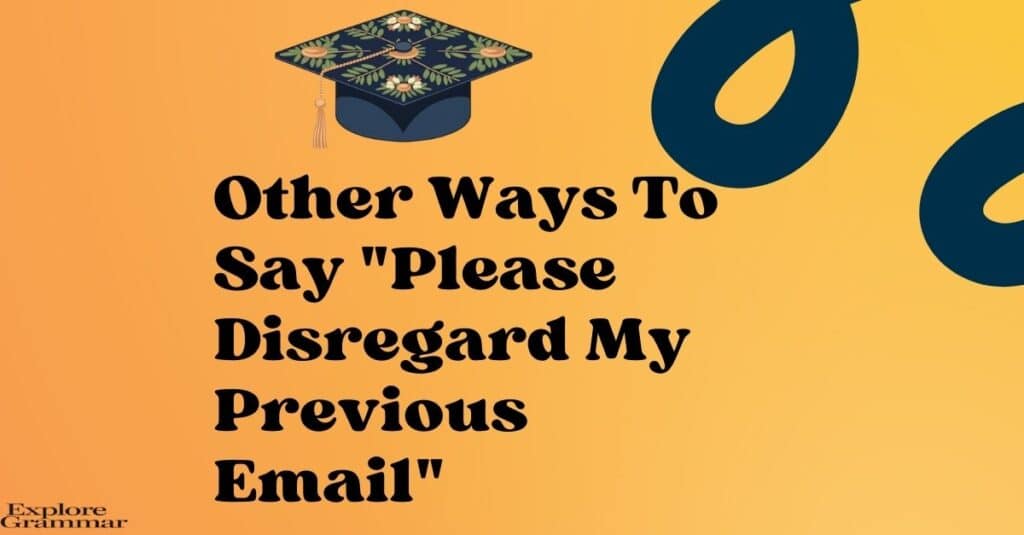We’ve all been there. You hit send on an email, only to realize you’ve made a mistake or shared outdated info. Don’t worry! There are plenty of polite ways to ask someone to ignore your last message. Let’s explore some professional and friendly alternatives to “Please disregard my previous email.”
What To Say Instead of “Please Disregard My Previous Email”
- Kindly disregard my earlier email
- Please ignore my previous message
- I’d like to retract my last email
- My apologies, please disregard the email I just sent
- I need to correct my previous email
- Please discard the information in my last email
- I’d like to rescind my previous email
- Let’s pretend my last email didn’t happen
- I’d appreciate if you could overlook my previous email
- Oops! Please disregard my last email
- My last email jumped the gun
- I spoke too soon in my previous email
- Let’s press rewind on that last email
- My last email got ahead of itself
- I need a do-over on my previous email
- My last email put the cart before the horse
- Scratch that last email
- My previous email jumped the shark
- Time to hit the undo button on my last email
- My last email needs a rain check
1. Kindly disregard my earlier email:
“Kindly disregard my earlier email” is a gentle way to ask someone to ignore your past email. It’s polite and works well in professional contexts. The word “kindly” adds a touch of warmth, making it less abrupt than a simple “disregard.”
Use this when you want to maintain a professional demeanor while acknowledging a minor slip-up in your email communication.
Example:
Subject:
Update on Project Timeline
Hi Sarah,
Kindly disregard my earlier email about the project deadline. I’ve just received new information from the client, and we actually have an extra week to complete the work.
I’ll send out a revised schedule shortly.
Thanks for your understanding,
Alex
2. Please ignore my previous message:
This straightforward approach is clear and concise. It’s a good choice for formal communication when you want to quickly address an error without drawing too much attention to it.
The phrase works well in various business scenarios, from correcting small typos to withdrawing entire proposals.
Example:
From:marketing@techco.com
To: subscribers@techco.com
Subject:
CORRECTION: Spring Sale Dates
Dear Valued Customers,
Please ignore my previous message about our Spring Sale. The correct dates for the sale are April 15-30, not March 15-30 as previously stated.
We apologize for any confusion and look forward to seeing you at the sale!
Best regards,
The TechCo Marketing Team
3. I’d like to retract my last email:
Using “retract” gives your request a more official tone, suitable for corporate settings. This phrase clearly states your intention to withdraw the previous message entirely.
It’s useful when you need to cancel email content due to significant errors or changes in circumstances. This approach shows you’re taking full responsibility for the mistake.
Example:
To: team@project.com
Subject:
Retracting Previous Announcement
Hello team,
I’d like to retract my last email announcing the new office location. After further discussion with management, we’ve decided to postpone the move. Please disregard any information shared in that message.
I’ll keep you updated on any future developments.
Thanks for your patience,
Jamie, HR Manager
4. My apologies, please disregard the email I just sent:
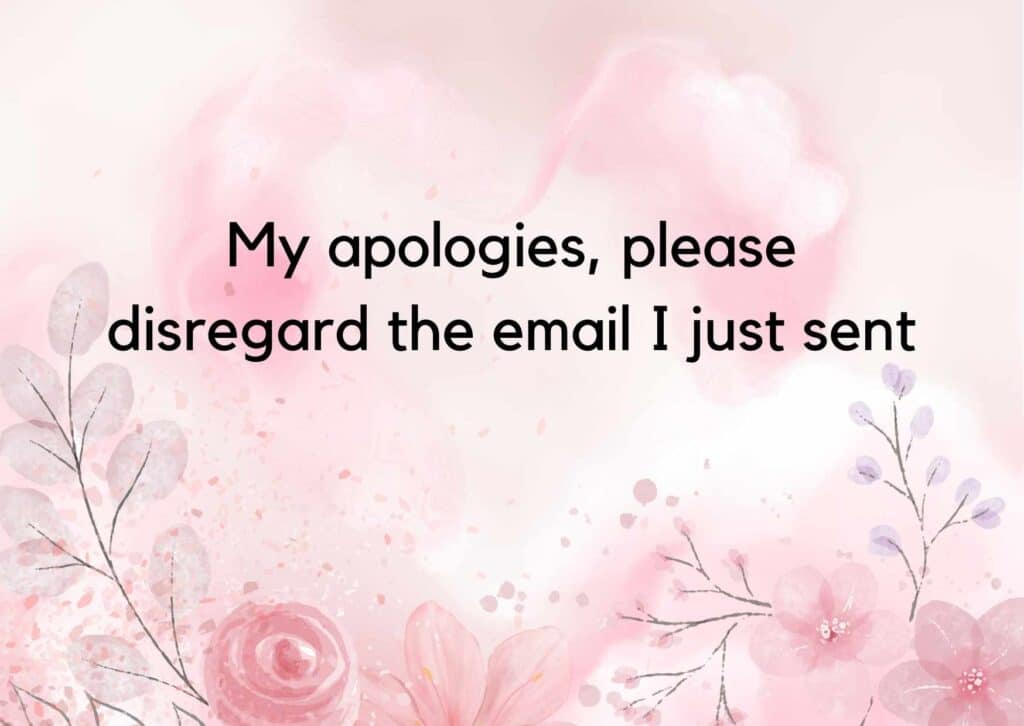
This phrase combines an apology with the request to ignore the previous message. It’s a good choice when you want to show you’re aware of your mistake and take responsibility for it.
This approach works well in both casual and professional settings, striking a balance between formal conduct and friendly communication.
Example:
Text message:
Chris: My apologies, please disregard the email I just sent about tonight’s dinner plans. I mixed up the dates – our reservation is actually for tomorrow night. 🤦♂️ See you then!
5. I need to correct my previous email:
“I need to correct my previous email” is direct and takes ownership of the situation. It’s useful when you not only want the recipient to ignore the previous message but also prepare them for new, correct information.
This approach works well in workplace situations where clarity and accuracy are crucial.
Example:
Comment on a shared document:
teamMembers I need to correct my previous email about the client presentation. The correct meeting time is 2 PM EST, not 2 PM PST. I’ve updated the calendar invite to reflect this change. Thanks for your flexibility!
6. Please discard the information in my last email:
“Please discard the information in my last email” is more forceful than simply asking to ignore a message. It suggests that the information shared was incorrect or no longer valid.
Use this when you want to ensure the recipient doesn’t act on or remember the content of your previous email. It’s particularly useful in business communication where acting on wrong information could have serious consequences.
Example:
Subject:
URGENT: Disregard Previous Product Recall Notice
Dear Retailers,
Please discard the information in my last email regarding the recall of SuperClean Detergent. After thorough testing, we’ve confirmed that the product meets all safety standards and does not need to be recalled.
We apologize for any inconvenience this may have caused. If you have any questions, please don’t hesitate to contact our customer service team.
Sincerely,
Taylor Smith, Product Safety Manager
7. I’d like to rescind my previous email:
“Rescind” is a formal word that means to take back or cancel. This phrase is best used in very formal discourse or official environments. It clearly communicates that you want to completely withdraw your previous message.
Use this when dealing with important matters where you need to ensure respectability and leave no room for misunderstanding.
Example:
LinkedIn message:
Dear Dr. Patel,
I’d like to rescind my previous email accepting the speaking engagement at your upcoming conference. Unfortunately, due to an unforeseen scheduling conflict, I will not be able to attend. I sincerely apologize for any inconvenience this may cause.
Please let me know if you’d like to discuss alternative ways I could contribute to the event.
Best regards,
Professor Johnson
8. Let’s pretend my last email didn’t happen:
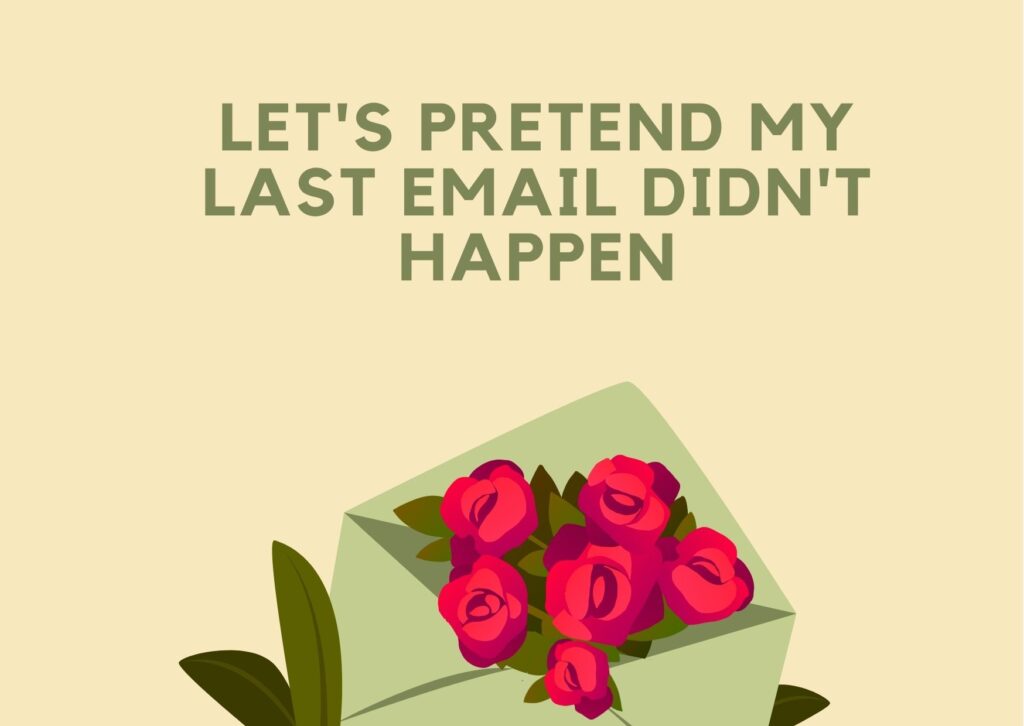
This lighthearted phrase can help softly neglect a minor mistake in less formal situations. It’s a friendly way to acknowledge an error while asking to move past it.
Use this with colleagues you have a good rapport with or in more casual business environments. It can help maintain a positive atmosphere even when addressing mistakes.
Example:
Slack message:
Hey team! 😅 Let’s pretend my last email didn’t happen. I accidentally sent out last year’s holiday party details instead of this year’s. New email with correct info coming your way in 5… 4… 3…
9. I’d appreciate if you could overlook my previous email:
This polite phrase shows respect for the recipient while asking them to gently overlook your mistake. It’s a good choice when you want to maintain professionalism but also inject a bit of humility into your error acknowledgment.
This approach works well in most professional settings, from email correspondence to official communication.
Example:
Subject:
Regarding Previous Email
Dear Ms. Rodriguez,
I’d appreciate if you could overlook my previous email about the quarterly report. I inadvertently attached an outdated version of the document.
I’ve included the correct, up-to-date report with this message. Thank you for your understanding.
Best regards,
Sam Lee, Financial Analyst
10. Oops! Please disregard my last email:
This casual and friendly approach works well for communication errors in less formal settings or with close colleagues. The “Oops!” acknowledges the mistake in a lighthearted way,
while still asking the recipient to ignore the previous message. Use this when you want to preserve professionalism while keeping the tone relaxed and approachable.
Example:
Tweet:
followers Oops! Please disregard my last tweet about the store closing. Turns out we’re not closing, just renovating! 🎉 We’ll be open throughout the process. Come see our new look taking shape! #ShopLocal #Renovation
11. My last email jumped the gun:
“My last email jumped the gun” means you sent an email too soon or before you had all the facts. It’s a casual way to admit you made a mistake without sounding too formal. Use this when you want to keep things light but still professional.
Example:
Subject:
Correction on Team Outing
Hi Team,
My last email jumped the gun on our Friday outing plans. Turns out the bowling alley is closed for renovations. Let’s brainstorm new ideas at our morning meeting.
Sorry for the mix-up!
Jess
12. I spoke too soon in my previous email:
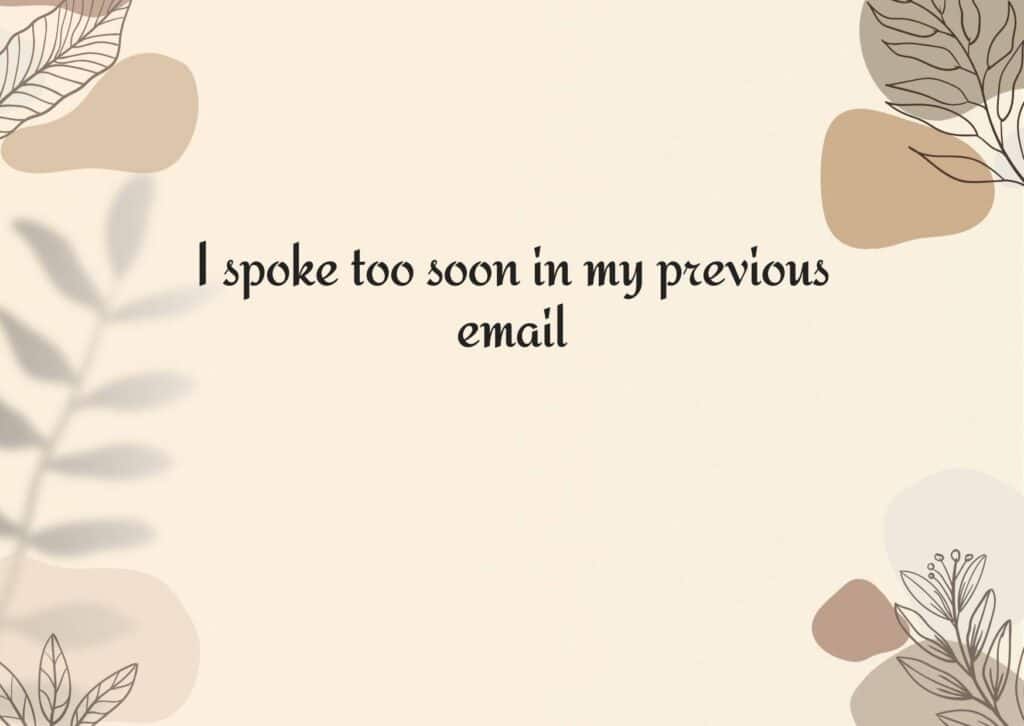
“I spoke too soon in my previous email” is a simple way to say you shared info before you should have. It works well when you need to take back something you said or promised too quickly. It’s honest and shows you’re aware of your mistake.
Example:
Text message:
Alex:
Hey Sam, I spoke too soon in my previous email about the extra concert tickets. My cousin decided to use them after all. Rain check on the show?
13. Let’s press rewind on that last email:
This phrase uses the idea of rewinding a video to suggest going back and erasing the last email. It’s a playful way to ask someone to forget what you just sent, perfect for lighter work settings or with close colleagues.
Example:
Slack message:
channel Let’s press rewind on that last email about casual Friday. Turns out the boss will be bringing clients to the office, so let’s stick to our usual dress code this week. 👔👚
14. My last email got ahead of itself:
“My last email got ahead of itself” is another way to say you sent info too early. It’s like saying the email ran faster than your brain! Use this when you want to politely admit you shared something before it was ready or confirmed.
Example:
Comment on a shared document:
Hey team, my last email got ahead of itself on the new project timeline. We’re still waiting for final approval from the client. I’ll update everyone once we have the green light.
15. I need a do-over on my previous email:
“Do-over” means a chance to try again. This casual phrase is like asking for a fresh start. It’s friendly and shows you want to correct your mistake. Use it when you want to completely replace your last email with new info.
Example:
Subject:
Project X Update – Take 2
Hi Janet,
I need a do-over on my previous email about Project X’s budget. I mixed up some numbers that threw off the whole forecast. Here’s the correct breakdown…
Thanks for your patience,
Mark
16. My last email put the cart before the horse:
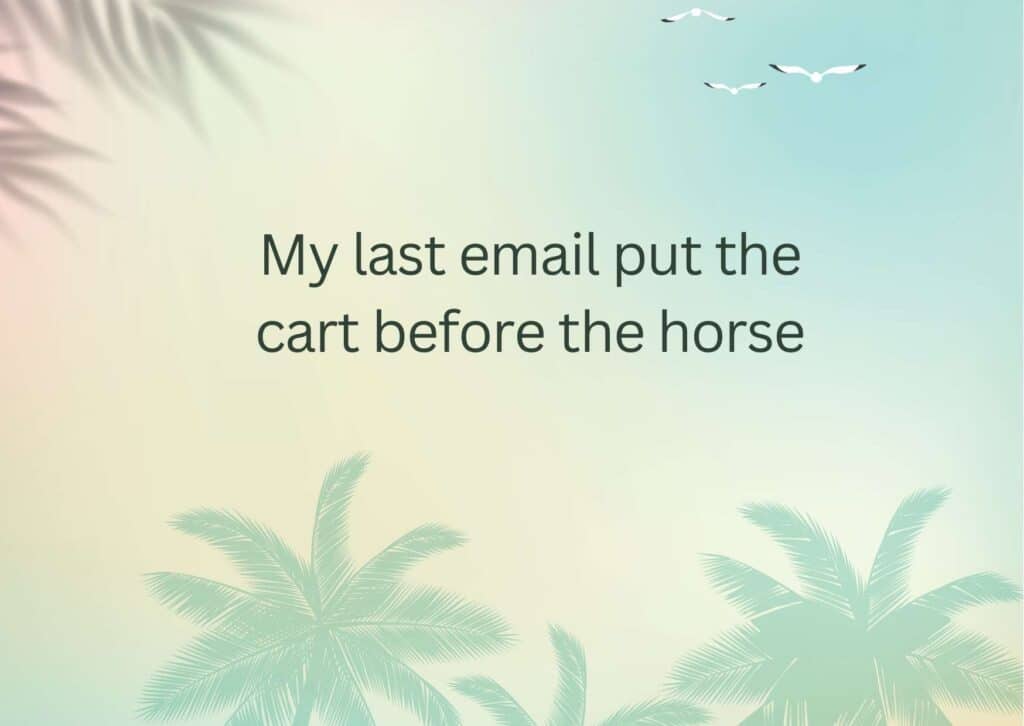
This old saying means doing things in the wrong order. In emails, it suggests you shared info too soon or without proper preparation. It’s a colorful way to admit a mistake while keeping things friendly.
Example:
LinkedIn message:
Hi connections,
My last post put the cart before the horse on our company’s expansion news. We’re still in talks, and nothing’s final yet. I’ll share confirmed updates when we have them. Thanks for understanding!
Best,
Tara, CEO of StartUp Inc.
17. Scratch that last email:
“Scratch that” is a casual way to say “forget it” or “ignore that.” This short and sweet phrase quickly tells the reader to erase your last message from their mind. It’s best for quick corrections or with people you know well.
Example:
Text message:
Chris: Scratch that last email about meeting at Joe’s Cafe. They’re closed today. How about we try the new sandwich place instead?
You Might Like: Other Ways to Say “Looking Forward to Meeting You”
18. My previous email jumped the shark:
This funny phrase comes from TV shows that do something too extreme or silly. In emails, it means you sent something that was way off or over-the-top. Use this to lighten the mood when you’ve made a big goof.
Example:
Tweet:
Whoops! My previous tweet about free ice cream for life jumped the shark. We’re giving away free scoops this Saturday only. Still cool, right? 🍦
You Might Like: Other Ways to Say “Unfortunately” in A Formal Email
19. Time to hit the undo button on my last email:
This phrase borrows the idea of an “undo” button from computers. It’s a clear way to say you want to take back what you sent. It’s casual but still works in most office settings.
Example:
Subject:
Undo – Office Move Date
Hello everyone,
Time to hit the undo button on my last email about our office move. The date is pushed back by a month. I’ll send a new schedule once it’s confirmed.
Sorry for any confusion,
Pat from HR
You Might Like: Other Ways to Say “Nice to See You Again”
20. My last email needs a rain check:
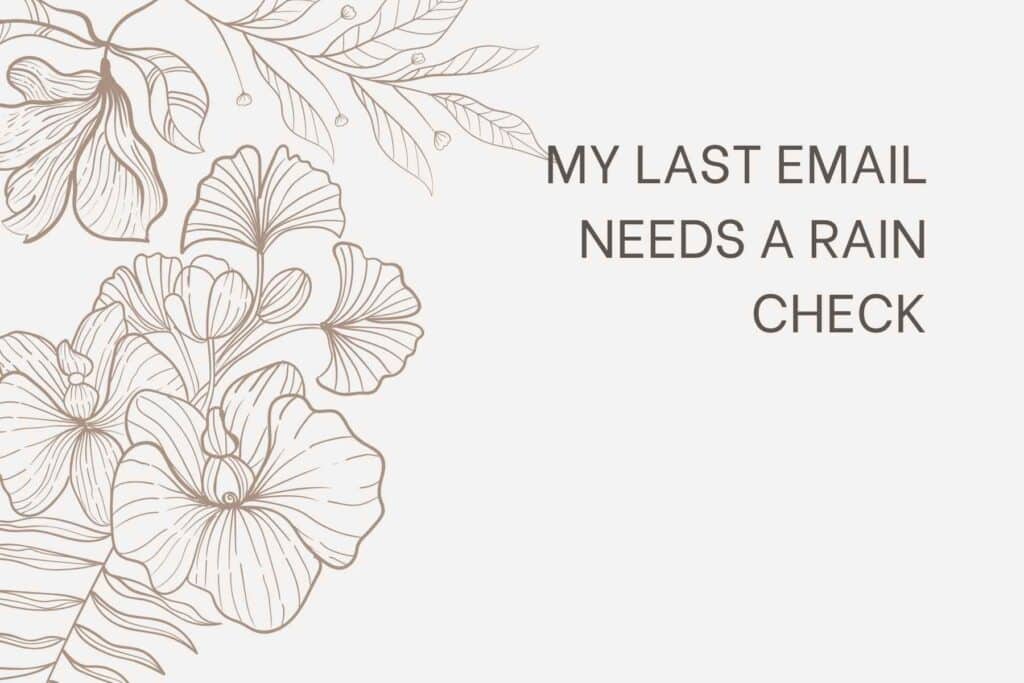
A “rain check” usually means postponing plans. For emails, it suggests putting off or canceling what was in your last message. This phrase works well when you need more time or when plans have changed.
Example:
Instagram DM:
Hey followers! My last post needs a rain check. The livestream Q&A with our founder is postponed due to tech issues. We’ll reschedule soon and keep you posted! 📅👀

George Larry is a grammar enthusiast and blogger at Explore Grammar. With years of experience in English grammar, he excels in teaching sentence structure, synonyms,punctuation, and language clarity. His expertise helps readers understand and use grammar rules effectively, enhancing their writing skills and appreciation for the English language.

